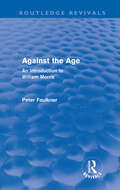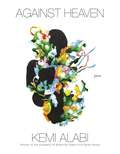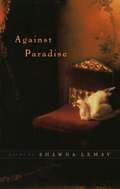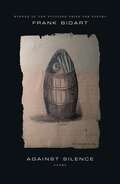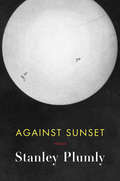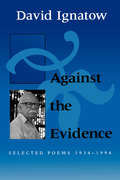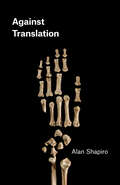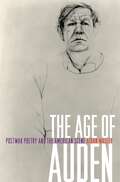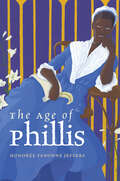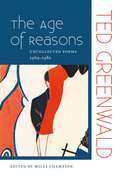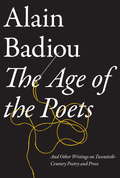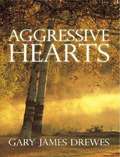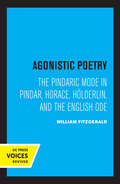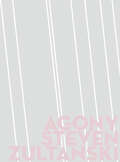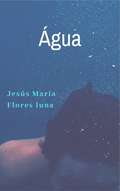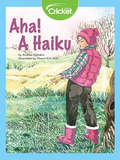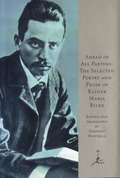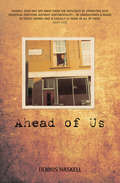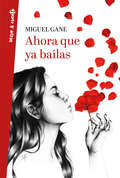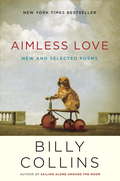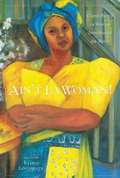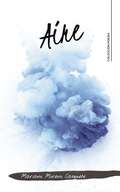- Table View
- List View
Against The Age: An Introduction to William Morris (Routledge Revivals)
by Peter FaulknerStudents new to the work of William Morris will find the full range of his achievements covered in this reissue of Peter Faulkner's excellent biography, first published in 1980. The author has carefully placed Morris in the context of the Victorian age, but has also suggested the relevance of his ideas today. The six chapters are organised biographically and cover all aspects of Morris’s work in poetry, fiction, design and socialist politics. The emphasis is on his continuous struggle against the age in which he lived, seen as an idealism which went through various stages from the wistfulness of The Earthly Paradise through the practical activities of the firm of Morris & Company to the socialism of Morris's later years. The book quotes freely from writings by Morris which are not easily accessible and gives an overall account from which the student can develop his specialist interests. This reissue will appeal to sixth-formers and undergraduates interested in the Victorian period, as seen through one of its most striking personalities. When this book appeared in 1980, Morris’s reputation had risen again after the low estimates of the interwar period. This was due both to the reappraisal of his politics and to the expanding popularity of his designs. Against the Age offers a clear account of Morris’s career for those developing an interest in his numerous achievements. It covers the whole range of Morris’s work, and argues for his significance as a writer of both poetry and prose. Since 1980 our knowledge of Morris has been enriched by the publication of Norman Kelvin’s edition of his Collected Letters, by the late Nicholas Salmond’s editions of his contributions to the socialist journals, by Fiona MacCarthy’s biography of 1984, and by the increasing recognition of Morris as a pioneer of environmentalism. However, the book retains its value for its wide coverage and its balanced attitude to Morris’s achievements, and for its encouragement to readers to consider the issues that make Morris of continuing importance today.
Against Heaven: Poems
by Kemi AlabiWinner of the Academy of American Poets First Book Award, selected by Claudia Rankine. Kemi Alabi’s transcendent debut reimagines the poetic and cultural traditions from which it is born, troubling the waters of some of our country’s central and ordained fictions—those mythic politics of respectability, resilience, and redemption. Instead of turning to a salvation that has been forced upon them, Alabi turns to the body and the earth as sites of paradise defined by the pleasure and possibility of Black, queer fugitivity. Through tender love poems, righteous prayers, and vital provocations, we see the colonizers we carry within ourselves being laid to rest.Against Heaven is a praise song made for the flames of a burning empire—a freedom dream that shapeshifts into boundless multiplicities for the wounds made in the name of White supremacy and its gods. Alabi has written an astonishing collection of magnificent range, commanding the full spectrum of the Black, queer spirit’s capacity for magic, love, and ferocity in service of healing—the highest power there is.
Against Paradise
by Shawna LemayShawna Lemay’s rich, amused, insistent, ingenious meditation on Venice will surprise readers with its peculiar grace. Here is the work of an elegant raconteur; a self-effacing, sharp-eared occupier of voices; a high-toned, compassionate gossip. From many mouths, she offers us the city, doomed, full of light. Lemay’s Venice is a small, crowded community of the delightfully eccentric dead. Through her quirky dramatic monologues, each one shimmering with a companionable intelligence, we meet them – George Eliot, Peggy Guggenheim, Lord Byron, Mary Shelley, Effie Ruskin, Ernest Hemingway, Titian, various unnamed others; we meet them in mid-speech; it seems they have never stopped talking, talking, telling now (or refusing still to tell) their secrets, protecting their vanities still, finally saying what they truly think. Lemay has given us an entire world, dark, haughty, watery, beautiful, full of voices, sedimented with stories.
Against Silence: Poems
by Frank BidartAn urgent new collection from the winner of the Pulitzer Prize and the National Book Award and “one of the undisputed master poets of our time” (Craig Morgan Teicher, NPR)Words, voices reek of the worlds from which theyemerge: different worlds, each with its all but palpablearoma, its parameters, limitations, promise.Words—there is a gap, nonetheless alwaysand forever, between words and the world—slip, slide, are imprecise, BLIND, perish. •Set up a situation,—. . . then reveal an abyss.For more than fifty years, Frank Bidart has given voice to the inner self, to the depths of his own psyche and the unforgettable characters that populate his poems. In Against Silence, the Pulitzer Prize winner’s eleventh collection of poetry, Bidart writes of the cycles we cannot escape and the feelings we cannot forget. Our history is not a tabula rasa but a repeating, refining story of love and hate, of words spoken and old cruelties enacted. Moving among the dead and the living, the figures of his life and of his past, Bidart calls reality forth—with nothing settled and nothing forgotten, we must speak.
Against Sunset: Poems
by Stanley PlumlyA powerful new volume from the National Book Award finalist that demonstrates how the lyric is essentially elegiac. Whether addressing the deaths of friends and other poets or celebrating the closing of the day and the autumn of the seasons, Against Sunset reveals Stanley Plumly at his most personal and intimate. As much an homage to the rich tradition of the Romantics as it is a meditation on memory itself, these poems live at the edges of disappearances. From "Against Sunset" The horizon, halfway disappeared between above and below-- night falls too or does it also rise out of the death-glitter of water? And if night is the long straight path of the full moon pouring down on the face of the deep, what makes us wish we could walk there, like a flat skipped stone?
Against the Evidence: Selected Poems, 1934–1994 (Wesleyan Poetry Series)
by David IgnatowFor over half a century, David Ignatow has crafted spare, plain, haunting poetry pf working life, urban images, and dark humor. The poetic heir of Whitman and William Carlos Williams, Ignatow is characteristically concerned with human mortality and human alienation in the world: the world as it is, defined by suffering and despair, yet at crucial times redeemed by cosmic vision and shared lives. His development as a poet is chronicled in Against the Evidence, title of the poem in part quoted above and meant by Ignatow as the metaphor for the whole body of his work.Where his previous collections have been organized thematically, Ignatow here arranges his poems "according to the decade in which they were written…returning each to its chronological order." Against the Evidence charts the evolution of his themes from the earliest origin in the Thirties to their present extraordinary manifestation in a variety of poetic forms and modes.
Against the Tide: The Story of Watchman Nee
by Angus KinnearThe engrossing, moving biography of one of China's better-known Christians, the dedicated evangelist and gifted Bible teacher Watchman Nee.
Against Translation (Phoenix Poets)
by Alan ShapiroWe often ask ourselves what gets lost in translation—not just between languages, but in the everyday trade-offs between what we experience and what we are able to say about it. But the visionary poems of this collection invite us to consider: what is loss, in translation? Writing at the limits of language—where “the signs loosen, fray, and drift”—Alan Shapiro probes the startling complexity of how we confront absence and the ephemeral, the heartbreak of what once wasn’t yet and now is no longer, of what (like racial prejudice and historical atrocity) is omnipresent and elusive. Through poems that are fine-grained and often quiet, Shapiro tells of subtle bereavements: a young boy is shamed for the first time for looking “girly”; an ailing old man struggles to visit his wife in a nursing home; or a woman dying of cancer watches her friends enjoy themselves in her absence. Throughout, this collection traverses rather than condemns the imperfect language of loss—moving against the current in the direction of the utterly ineffable.
The Age of Auden: Postwar Poetry and the American Scene
by Aidan WasleyHow W. H. Auden’s emigration to the United States changed the course of postwar American poetryW. H. Auden's emigration from England to the United States in 1939 marked more than a turning point in his own life and work—it changed the course of American poetry itself. The Age of Auden takes, for the first time, the full measure of Auden's influence on American poetry. Combining a broad survey of Auden's midcentury U.S. cultural presence with an account of his dramatic impact on a wide range of younger American poets—from Allen Ginsberg to Sylvia Plath—the book offers a new history of postwar American poetry.For Auden, facing private crisis and global catastrophe, moving to the United States became, in the famous words of his first American poem, a new "way of happening." But his redefinition of his work had a significance that was felt far beyond the pages of his own books. Aidan Wasley shows how Auden's signal role in the work and lives of an entire younger generation of American poets challenges conventional literary histories that place Auden outside the American poetic tradition. In making his case, Wasley pays special attention to three of Auden's most distinguished American inheritors, presenting major new readings of James Merrill, John Ashbery, and Adrienne Rich. The result is a persuasive and compelling demonstration of a novel claim: In order to understand modern American poetry, we need to understand Auden's central place within it.
The Age of Phillis (Wesleyan Poetry Series)
by Honorée Fanonne JeffersIn 1773, a young, African American woman named Phillis Wheatley published a book of poetry that challenged Western prejudices about African and female intellectual capabilities. Based on fifteen years of archival research, The Age of Phillis, by award-winning writer Honorée Fanonne Jeffers, imagines the life and times of Wheatley: her childhood in the Gambia, West Africa, her life with her white American owners, her friendship with Obour Tanner, and her marriage to the enigmatic John Peters. Woven throughout are poems about Wheatley's "age"—the era that encompassed political, philosophical, and religious upheaval, as well as the transatlantic slave trade. For the first time in verse, Wheatley's relationship to black people and their individual "mercies" is foregrounded, and here we see her as not simply a racial or literary symbol, but a human being who lived and loved while making her indelible mark on history.mothering #1Yaay, Someplace in the Gambia, c. 1753afterthe after-birthis deliveredthe mother stopsholding her breaththe mid-wife giveswhat came beforeher just-washed painher insanity painan undeserved paina God-given painoh oh oh paindrum-talking painwitnessing painAllaha mother offersYou this giftprays You findit acceptableher living painher creature painher pretty-little-babypain
The Age of Reasons: Uncollected Poems 1969–1982
by Ted GreenwaldThis collection of Ted Greenwald's poetry, edited by Miles Champion, is a sampler of some of Greenwald's most breathtaking work. A New York poet with close ties to the New York School and the Language poets, Greenwald has written daily since the early 1960s, and none of the poems in this book are included in any of his books to date. These discrete works were written in advance of or alongside the extended explorations of a mutated triolet form that increasingly occupied him from the late 1970s on. This book can be seen as a companion to Common Sense, and provides further evidence of Greenwald's ability to think with his ear, to hear what's said as it arrives as a fresh sound or shape in his head. This work is singular in its pattern-making, its music-making, and its ability to simultaneously follow multiple paths. An online reader's companion will be available at tedgreenwald.site.wesleyan.edu
The Age of the Poets
by Bruno Bosteels Alain Badiou Emily ApterThe Age of the Poets revisits the age-old problem of the relation between literature and philosophy, arguing against both Plato and Heidegger's famous arguments. Philosophy neither has to ban the poets from the republic nor abdicate its own powers to the sole benefit of poetry or art. Instead, it must declare the end of what Badiou names the "age of the poets," which stretches from Hölderlin to Celan. Drawing on ideas from his first publication on the subject, "The Autonomy of the Aesthetic Process," Badiou offers an illuminating set of readings of contemporary French prose writers, giving us fascinating insights into the theory of the novel while also accounting for the specific position of literature between science and ideology.From the Trade Paperback edition.
Aggressive Hearts
by Gary James DrewesA series of rhyme and poems on healing and resolving feelings. These topics are on the angst, grief and hurt parts of life. All the aggressive issues presented in rhymes and poems. To take the hurt, loss, fear and pain and with rhyme bring some issues around to healing and resolve as each person heals and resolves at their own pace. These poems and rhymes are only another focus and feeling of the resolving process. Please enjoy your visit.
Agonistic Poetry: The Pindaric Mode in Pindar, Horace, Hölderlin, and the English Ode
by William FitzgeraldThis title is part of UC Press’s Voices Revived program, which commemorates University of California Press’s mission to seek out and cultivate the brightest minds and give them voice, reach, and impact. Drawing on a backlist dating to 1893, Voices Revived makes high-quality, peer-reviewed scholarship accessible once again using print-on-demand technology. This title was originally published in 1993.
Agony
by Steven ZultanskiAgony is the first in a trilogy of long confessional poems. It uses semi-rigorous mathematical and logical constraints to view the author's life and body, telescopically, as little bits of time and space. Everything written here is as true as possible – that is to say, pretty true. It attempts autobiography as a refutation of autobiography, and an elevation of the self as self-effacement. Love pops up as a theme quite a bit. So does self-mutilation, etc. There are a lot of numbers, but don't worry, it's more about politics and fantasy than numbers, even though, as usual, they show up everywhere. Just like pieces of your body after you've cut them off and scattered them all over the world, and then go out looking for them again, for some reason.
Água
by Jesús María Flores LunaÁgua apresenta poemas desde a aparição e transparência da água até os dias de hoje, seu correr por debaixo do cenário urbano. Um dos últimos grandes poemas da literatura mexicana.
Aha! A Haiku
by Andrea VlahakisLearn more about haiku, which are short poems, written in a style created in Japan more than 400 years ago.
Ahead of All Parting
by Rainer Maria Rilke Stephen MitchellThe reputation of Rainer Maria Rilke has grown steadily since his death in 1926; today he is widely considered to be the greatest poet of the twentieth century. This Modern Library edition presents Stephen Mitchell's acclaimed translations of Rilke, which have won praise for their re-creation of the poet's rich formal music and depth of thought. "If Rilke had written in English," Denis Donoghue wrote in The New York Times Book Review, "he would have written in this English." Ahead of All Parting is an abundant selection of Rilke's lifework. It contains representative poems from his early collections The Book of Hours and The Book of Pictures; many selections from the revolutionary New Poems, which drew inspiration from Rodin and Cezanne; the hitherto little-known "Requiem for a Friend"; and a generous selection of the late uncollected poems, which constitute some of his finest work. Included too are passages from Rilke's influential novel, The Notebooks of Malte Laurids Brigge, and nine of his brilliant uncollected prose pieces. Finally, the book presents the poet's two greatest masterpieces in their entirety: the Duino Elegies and The Sonnets to Orpheus. "Rilke's voice, with its extraordinary combination of formality, power, speed and lightness, can be heard in Mr. Mitchell's versions more clearly than in any others," said W. S. Merwin. "His work is masterful."
Ahead of Us
by Dennis Haskellbut in fact / we are as we are / together, alone, as you can see, / with elusive memories for company, /with your wisps of hair / disappearing as gently as breath. 'After Chemo' Ahead of Us is Dennis Haskell's eighth book of poetry. Dedicated to his wife Rhonda, who lost her battle with cancer after a long illness, Ahead of Us contains poems of love, of two people forging a partnership together and of the inevitable end of that partnership when one person dies. It is a celebration of life and and of the fragile thread that holds us here.
Ahora que ya bailas
by Miguel GaneEl nuevo poemario del autor de Con tal de verte volar, Miguel Gane. Naces, creces, amas, te rompen, aprendes y no mueres hasta que alguien deja de quererte. Estos poemas son la historia de Ella, la que fue callada porque sus gritos resonaban demasiado alto. Ella, que dejó de ser suya porque quien debía liberar su sonrisa, la acabó enjaulando y aplastando contra el asfalto. Sola, fue capaz de levantarse, de mirar a la cara a su pasado y decirle: «No me has vencido, soy indestructible». Ahora que ya bailas, el mundo entero va a quedarse a tus pies y donde antes había silencio ahora habrá música. La tuya.
Ahora que ya bailas
by Miguel GaneEl nuevo poemario del autor de Con tal de verte volar, Miguel Gane. Naces, creces, amas, te rompen, aprendes y no mueres hasta que alguien deja de quererte. Estos poemas son la historia de Ella, la que fue callada porque sus gritos resonaban demasiado alto. Ella, que dejó de ser suya porque quien debía liberar su sonrisa, la acabó enjaulando y aplastando contra el asfalto. Sola, fue capaz de levantarse, de mirar a la cara a su pasado y decirle: «No me has vencido, soy indestructible». Ahora que ya bailas, el mundo entero va a quedarse a tus pies y donde antes había silencio ahora habrá música. La tuya.
Aimless Love: New and Selected Poems
by Billy Collins"Billy Collins puts the 'fun' back in 'profundity.' "--Alice FultonFrom the two-term Poet Laureate of the United States Billy Collins comes his first compilation of new and selected poems in twelve years. Aimless Love combines more than fifty new poems with selections from four previous books--Nine Horses, The Trouble with Poetry, Ballistics, and Horoscopes for the Dead. Collins's unmistakable voice, which brings together plain speech with imaginative surprise, is clearly heard on every page, reminding us how he has managed to enrich the tapestry of contemporary poetry and greatly expand its audience. His work is featured in top literary magazines such as The New Yorker, Poetry, and The Atlantic, and he sells out reading venues all across the country. Appearing regularly in The Best American Poetry series, his poems appeal to readers and live audiences far and wide and have been translated into more than a dozen languages. By turns playful, ironic, and serious, Collins's poetry captures the nuances of everyday life while leading the reader into zones of inspired wonder. In the poet's own words, he hopes that his poems "begin in Kansas and end in Oz." Touching on the themes of love, loss, joy, and poetry itself, these poems showcase the best work of this "poet of plenitude, irony, and Augustan grace" (The New Yorker).Envoy Go, little book, out of this house and into the world, carriage made of paper rolling toward town bearing a single passenger beyond the reach of this jittery pen and far from the desk and the nosy gooseneck lamp. It is time to decamp, put on a jacket and venture outside, time to be regarded by other eyes, bound to be held in foreign hands. So off you go, infants of the brain, with a wave and some bits of fatherly advice: stay out as late as you like, don't bother to call or write, and talk to as many strangers as you can.Praise for Aimless Love"America's favorite poet."--The Wall Street Journal "[Billy Collins's] poetry presents simple observations, which create a shared experience between [him] and his readers, while further revealing how he takes life's everyday humdrum experiences and makes them vibrant. While Collins's previous collections have already validated his brilliance and staying power as a poet, he continues to reveal an ever-growing maturity."--The Times Leader"In selections from his four most recent collections . . . and fifty-one glimmering new poems, former poet laureate and reader favorite Collins, the maestro of the running-brook line and the clever pivot, celebrates the resonance and absurdity of what might be called the poet's attention-surfeit disorder. . . . But Collins' droll wit is often a diversionary tactic, so that when he strikes you with the hard edge of his darker visions, you reel."--BooklistFrom the Hardcover edition.
Ain't I a Woman!: Classic Poetry by Women from Around fhe World
by Illona LinthwaiteSpanning the centuries from Sappho's Greece to modern South Africa, the voices of these women poets express themes of love, motherhood, injustice, loss, and racial and sexual oppression. Featured writers include Maya Angelou, Alice Walker, Audre Lorde, Nikki Giovanni, and Marge Piercy.
The Air Show
by Peter ScuphamPeter Scupham's new collection brings together the themes of childhood and war. For the poet, a child during World War II, the two themes naturally coincide, as rumors of war, air raids, and rationing pervade his memories of boyhood.
Aire
by Mariano Moreno CasqueteEl recuerdo es un impostor que nos desafía desde el otro lado del espejo. El poemario Aire se compone de cuatro partes: el ruido del tiempo, viento, destiempo y soñado perdido y ajeno. La ausencia del amor, una ausencia que no es solo recuerdo, también es niebla o aire que no se desvanece del todo. Un fantasma, una realidad a destiempo, un espejismo... No es posible encontrar ningún espejo que refleje el humo, y el recuerdo se ha convertido en humo, en un impostor que nos observa y nos desafía desde el otro lado del espejo, porque uno es ya otro cuando recuerda.
